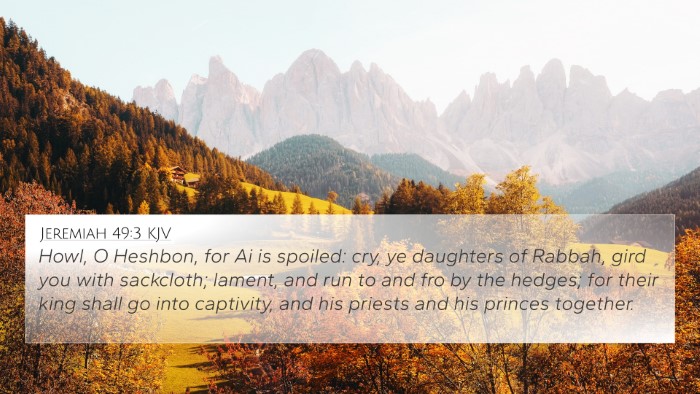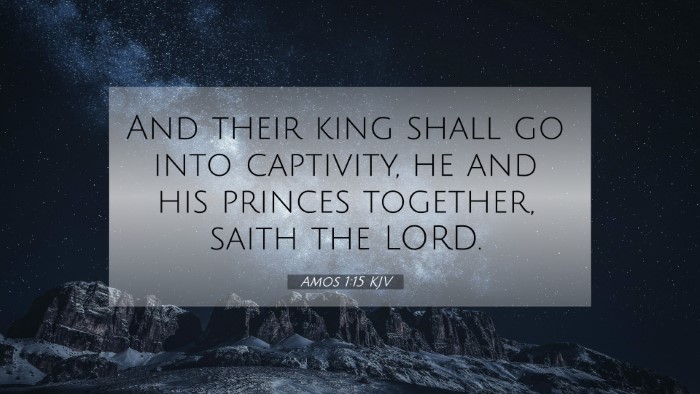Old Testament
Genesis Exodus Leviticus Numbers Deuteronomy Joshua Judges Ruth 1 Samuel 2 Samuel 1 Kings 2 Kings 1 Chronicles 2 Chronicles Ezra Nehemiah Esther Job Psalms Proverbs Ecclesiastes Song of Solomon Isaiah Jeremiah Lamentations Ezekiel Daniel Hosea Joel Amos Obadiah Jonah Micah Nahum Habakkuk Zephaniah Haggai Zechariah MalachiAmos 1:15 Similar Verses
Amos 1:15 Cross References
And their king shall go into captivity, he and his princes together, saith the LORD.
Uncover the Rich Themes and Topics of This Bible Verse
Listed below are the Bible themes associated with Amos 1:15. We invite you to explore each theme to gain deeper insights into the Scriptures.
Amos 1:15 Cross Reference Verses
This section features a detailed cross-reference designed to enrich your understanding of the Scriptures. Below, you will find carefully selected verses that echo the themes and teachings related to Amos 1:15 KJV. Click on any image to explore detailed analyses of related Bible verses and uncover deeper theological insights.

Jeremiah 49:3 (KJV) »
Howl, O Heshbon, for Ai is spoiled: cry, ye daughters of Rabbah, gird you with sackcloth; lament, and run to and fro by the hedges; for their king shall go into captivity, and his priests and his princes together.
Amos 1:15 Verse Analysis and Similar Verses
Understanding Amos 1:15
Amos 1:15 reads, "And he shall go out, and he shall go in, and he shall be taken away, and he shall see that he is no more to be, and he shall be taken away from his people." This verse emerges from a prophecy concerning the fate of the land of Judah, where God's judgment and consequences for sin are made evident. Below, we delve into the combined insights from various commentaries to understand the meaning and implications of this scripture.
Contextual Background
The Book of Amos is one of the Minor Prophets in the Old Testament, emphasizing social justice, divine judgment, and the necessity of repentance. Amos, a shepherd and a farmer, delivers God's message to Israel during a time of prosperity and complacency.
Commentary Insights
-
Matthew Henry:
Henry highlights that this verse underscores God's sovereignty over nations and the inevitability of His judgment against those who oppose Him. The prophecy serves as a warning that, despite material wealth, spiritual poverty leads to downfall.
-
Albert Barnes:
Barnes emphasizes the impending doom that awaits religiously unresponsive people. He explains that the phrase "he shall go out" signifies a departure from God's favor, depicting a dire transition for the unrepentant.
-
Adam Clarke:
Clarke provides an interpretative lens that views the 'going in and out' as a metaphor for the life cycle of judgment and consequence. He notes that to be "taken away" symbolizes the removal from one's land as a form of divine wrath.
Thematic Connections
Amos 1:15 connects thematically with various other scriptures, reinforcing the idea of judgment and the consequences of spiritual neglect. Below are notable cross-references that enrich our understanding:
- Isaiah 10:3: Addresses the dire outcome for those who disregard God's call, mimicking Amos' themes of judgment.
- Jeremiah 25:29: Discusses God's judgment upon the nations, highlighting the universal aspect of divine retribution.
- Ezekiel 3:19: Emphasizes individual accountability in the face of prophetic warnings, echoing Amos’ call for repentance.
- 2 Chronicles 7:14: Exhorts a humble return to God to mitigate impending judgment, highlighting the need for responsiveness to divine correction.
- Micah 3:1-4: Condemns leaders for their injustices, paralleling Amos’ criticism of societal neglect.
- Lamentations 3:39: Paints the consequence of sin leading to suffering, offering a sobering reflection on the themes of Amos.
- Matthew 24:2: Jesus' prophetic declaration of the temple's destruction draws upon the prophetic themes found in Amos, showing continuity in God's judgment across testaments.
- Revelation 20:15: The ultimate judgment in the New Testament echoes the necessity of accountability before God, reinforcing the notion presented in Amos.
Interpretative Reflections
Combining these insights leads us to a profound understanding of Amos 1:15, where the themes of divine judgment, human accountability, and the urgency of repentance are resoundingly clear. The verse starkly reminds us that neglecting the call of God can lead to complete forfeiture of His blessings and protection.
SEO Keywords Integration
In exploring Amos 1:15, we can appreciate the connections between Bible verses that elucidate the tragic outcomes of steadfast unfaithfulness. This verse serves as a critical reference point for a comparative Bible verse analysis, especially when looking at passages related to God's judgment. Tools for Bible cross-referencing such as a Bible concordance can significantly enhance our understanding of how themes from Amos resonate in both the Old and New Testaments.
Cross-Referencing Techniques
For anyone seeking to deepen their understanding of scripture through scriptural cross-referencing, we recommend employing methods such as:
- Utilizing a Bible cross-reference guide to find related verses.
- Engaging in cross-reference Bible study for thematic exploration.
- Applying a Bible reference resource for identifying connections across biblical texts.
Conclusion
Amos 1:15 serves not only as a warning from the past but as a timeless reminder of the principles of accountability and the necessity of a heartfelt return to divine guidance. By studying this verse in conjunction with related scriptures, we gain a richer understanding of God’s message throughout the Bible, fostering a deeper spiritual awareness and commitment.


